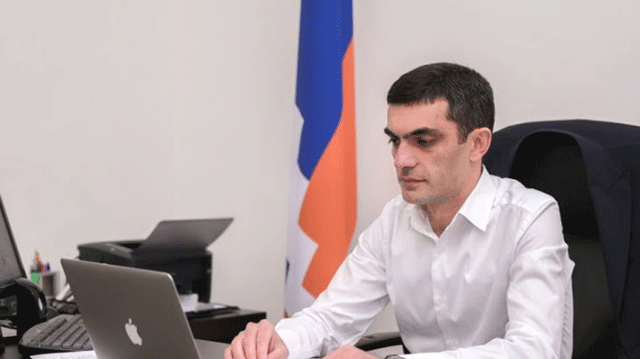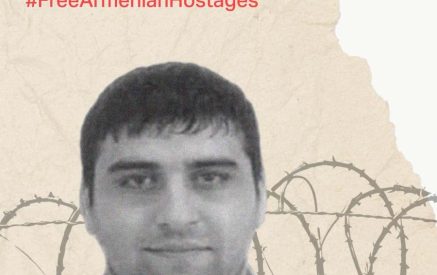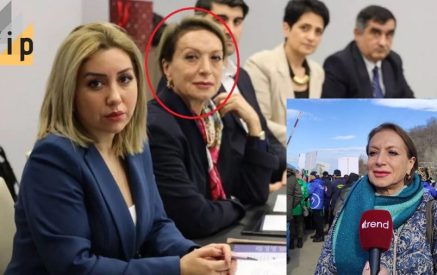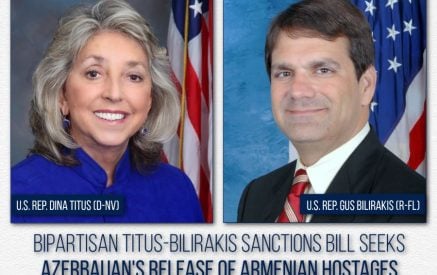Interview of Minister of Foreign Affairs of the Republic of Artsakh Sergey Ghazaryan to Artsakhpress News Agency
In the short term, our efforts are aimed at the speedy restoration of the functioning of the Lachin Corridor in line with the Trilateral Statement of 9 November 2020 and, therefore, the complete lifting of the blockade of Artsakh, which has been going on for 58 days.
In this regard, the Ministry of Foreign Affairs of the Republic of Artsakh uses all available resources and opportunities to inform the international community about the real goals of Azerbaijan’s blockade on Artsakh, as well as its humanitarian, economic and other consequences. Our main task is to consolidate the position of the international community against the illegal actions of Azerbaijan and create an environment that will make it impossible for Azerbaijan to continue the blockade of Artsakh or repeat such a scenario in the future. In addition to targeted statements and appeals, we consider it necessary to take more effective measures against Azerbaijan, in particular, international sanctions, including personal ones, against officials of the regime responsible for such illegal actions. To achieve these goals, the Artsakh Foreign Ministry uses every opportunity to present its position to the international community.
Read also
In the medium term, we will continue to take consistent steps aimed at promoting Artsakh’s subjectivity, which implies a set of measures in the political, diplomatic, legal and information spheres. The Artsakh Foreign Ministry will use all available opportunities to inform the international community about the essence of the Azerbaijan-Karabakh conflict, the discriminatory and genocidal policy pursued by Azerbaijan against the people of Artsakh for decades, the political and legal justification for the proclamation and building of Artsakh’s statehood. We will continue to consistently defend the position of Artsakh on the entire range of issues related to the achievement of a comprehensive and just settlement of the Azerbaijan-Karabakh conflict. In this context, we attach key importance to the restoration of the international negotiating mechanism to resolve the conflict with direct and equal participation in the process of the authorities of Artsakh.
In the medium and long term, the Ministry of Foreign Affairs of Artsakh will continue to advocate for the right to self-determination exercised by the people of Artsakh, develop and deepen the international ties of the republic at various levels. Particular attention will be paid to raising awareness about Artsakh and the just struggle of its people for their inalienable rights.
What goals do you think Azerbaijan is pursuing by imposing a blockade against Artsakh?
By imposing a blockade against Artsakh, Azerbaijan is trying to create unbearable living conditions in Artsakh, exert psychological pressure on the people and, ultimately, force them to leave their homeland. We consider such actions as one of the elements of the genocidal policy of Azerbaijan aimed at the destruction of the people of Artsakh as such.
Today’s blockade is a direct continuation of the military aggression against the Republic of Artsakh and its people unleashed by Azerbaijan in 2020 with the direct involvement of Turkey, mercenaries and terrorist fighters from the Middle East. As a result of this aggression, vast territories of Artsakh, including the city of Shushi and the Hadrut region, were occupied by Azerbaijan. About 38 thousand people lost their homes and became refugees or IDPs. More than 90 thousand of the 150 thousand population of Artsakh were forced to take refuge in Armenia, fleeing the horrors of war. However, after the ceasefire was established, most of the inhabitants of Artsakh returned to their homeland. Having failed to achieve all of its objectives during the aggression in 2020, Azerbaijan resorted to other methods to implement its criminal plans. The ultimate goal of this policy is to suppress the right of the people of Artsakh to self-determination by expelling and destroying the people of Artsakh as such. Azerbaijan is acting on the principle “no people – no problem”.
How do you assess the international response to Azerbaijan’s actions to blockade Artsakh?
We welcome the statements of the international community on the need to immediately unblock the Lachin Corridor and Artsakh. In this context, it is important to take not a fragmentary, but a comprehensive approach to the situation created in Artsakh as a result of the blockade by Azerbaijan.
The blockade of Artsakh is not only a humanitarian problem, but also a matter of violation of the individual and collective rights of its people. The international community should consider the blockade not as an isolated case, but rather an episode in a series of large-scale and systematic attacks by Azerbaijan against the people of Artsakh and violations of their rights. By imposing a blockade, Azerbaijan seeks to deliberately create such living conditions for the people of Artsakh that are designed to make them leave their historical homeland. Statements by the Azerbaijani leadership that the Lachin Corridor is open to those wishing to leave Artsakh indicate that through the blockade the Azerbaijani authorities are implementing a policy of ethnic cleansing of Artsakh.
We call upon the community of States to take a comprehensive legal approach to the issue of Artsakh and the rights of its people, and to immediately activate the existing mechanisms for genocide prevention, in line with their international obligations to prevent mass atrocities.
Keeping Artsakh under blockade, Azerbaijan simultaneously puts forward demands both on Artsakh and Armenia. From Artsakh, Azerbaijan demands the recognition of Azerbaijani control over the Lachin Corridor. How would you comment on this?
Azerbaijan’s demands to establish control over the Lachin Corridor are in direct contradiction to the provisions of the Trilateral Statement of 9 November 2020. Azerbaijan’s arguments that the Lachin Corridor is under the jurisdiction of Azerbaijan as part of the Lachin region, which, according to the Trilateral Statement, came under Azerbaijani control, have no basis. The signature of the Azerbaijani President under the Trilateral Statement is an expression of the direct and explicit consent of the Azerbaijani state to renounce control over the Lachin corridor and put it under the exclusive control of the Russian Peacekeeping Contingent.
In fact, Azerbaijan seeks to revise the special status of the Lachin Corridor by changing the situation on the ground and introducing new unilateral elements that contradict the Trilateral Statement. We have repeatedly stressed the illegitimacy of Azerbaijan’s attempts to unilaterally review the status and mode of operation of the Lachin Corridor.
In this regard, we reiterate that Azerbaijan’s claims about its alleged right to stop vehicles passing through the Lachin Corridor and conduct cargo inspections are baseless. The Trilateral Statement does not contain any restrictions on the transportation of cargo as to their nature, purpose or use.
How would you comment on the statements of the Azerbaijani authorities about their readiness to ensure the rights of the people of Artsakh?
Obviously, the establishment of Azerbaijani jurisdiction over the people of Artsakh and their rights will in fact be tantamount to their forcible expulsion from their homeland. If someone outside Artsakh had doubts about this, then Azerbaijan itself dispelled these doubts by imposing a blockade on Artsakh and provoking a humanitarian catastrophe.
The essence of the current stage of the conflict between Artsakh and Azerbaijan lies precisely in the fact that Azerbaijan is not only unable to guarantee the rights, but also pursues a deliberate and consistent policy to destroy the people of Artsakh as such.
The statements of the Azerbaijan leadership about their readiness to ensure the rights of the people of Artsakh are just a screen behind which Baku will try to complete its criminal plan. Which of the goals of Azerbaijan are real, and which are just a trick, is evidenced by the aforementioned statement of the president of this country, who said that anyone who did not want to obey Baku should leave Artsakh.
We strongly reject any proposals aimed at transferring jurisdiction over the rights of our people to Azerbaijan. We call on the international community to be guided, first of all, by the interests of the people living in Artsakh, who are threatened with ethnic cleansing and expulsion from their homeland. In the face of the impending catastrophe for the people of Artsakh, indifference and inaction by the international community will be connivance, if not complicity.
How does Artsakh see the ways of resolving the conflict between Artsakh and Azerbaijan?
From a substantive point of view, resolution of the Azerbaijan-Karabakh conflict should be aimed at eliminating its root cause related to the unwillingness of Azerbaijan to recognize the collective rights of the people of Artsakh, as well as correcting the consequences of their illegal use of military force against the Republic of Artsakh.
From a procedural point of view, the process of the conflict resolution should be based on decisions taken by the parties through negotiations. This is what international law requires. We support the idea of restoring the international mechanism for direct negotiations between Artsakh and Azerbaijan, through which we can reach an agreement that guarantees a just and lasting peace.
We consider the proposals of the international community on the need to create an international mechanism as evidence of the general understanding that the forcible subjugation of the people of Artsakh to the jurisdiction of Azerbaijan is a violation of international human rights law, and the practical implementation of this plan will lead to extreme manifestations of violence and persecution by Azerbaijan against the Armenians.
Therefore, we call upon the international community to continue efforts aimed at creating an appropriate environment for the peaceful resolution of the conflict on the basis of international law. Other ways to resolve this conflict are just condoning the genocidal policy of Azerbaijan.



























































